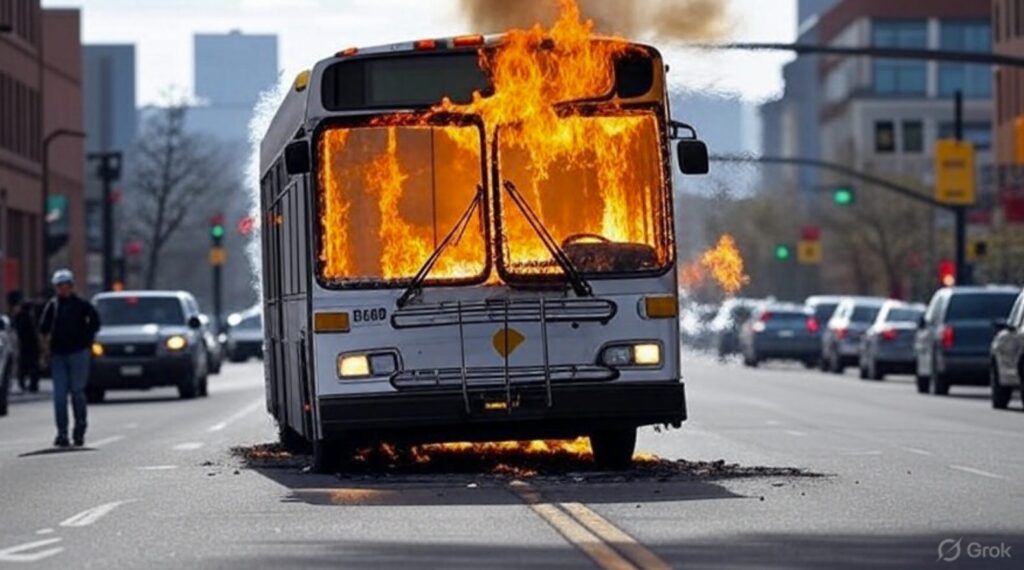In a stark admission that the electric vehicle revolution is more mirage than reality, Colorado’s Regional Transportation District (RTD) is set to borrow a whopping $539 million to replenish its bus fleet, effectively shelving its longheld EV bus dreams.
This move, detailed in RTD’s latest financial forecast, underscores the harsh lessons learned from pushing unripe green tech onto public transit systems: it doesn’t work, it costs a fortune, and taxpayers foot the bill for the fallout. For years, RTD has chased the holy grail of battery-electric buses under the banner of Colorado’s climate mandates, only to bail on contracts and pivot back to the reliable, efficient diesel engines that powered American mobility for decades.The plan targets replacing an aging fleet of 995 diesel buses, many nearing the end of their 12-year or 500,000-mile lifespan.
Over the next five years, RTD will tap sales taxes from metro Denver’s eight counties—funding 70% of its $1.2 billion annual budget—to finance these “clean diesel” purchases, adding to an already ballooning $2.7 billion debt load. Specifics include a $51 million chunk already approved for 47 diesel units to roll out on Denver’s East Colfax Avenue rapid transit line by 2027, initially pitched as hybrids but downgraded to straight diesel when electric options proved elusive.
This isn’t some one-off decision; it’s baked into a broader fleet transition strategy that prioritizes nearly 300 diesel hybrids by 2030 and a measly 75 battery-electrics by 2035, with full zero-emissions not until 2050—lagging far behind cities like Los Angeles and Seattle.
Why the retreat? Electric buses have been a spectacular flop for RTD. Back in 2023, the agency scrapped an $18 million deal for 17 battery-electrics because they lacked basic charging infrastructure—a rookie mistake that exposed the green agenda’s logistical nightmares. Officials cite a perfect storm of hurdles: tariffs jacking up costs, supply chain snarls, “Buy America” rules limiting options, and a dearth of manufacturers producing the right-sized vehicles—like the 60-footers needed for high-capacity routes.
New Flyer, a key U.S. player, stopped making those electric-hybrids, forcing RTD to either overpay for smaller 40-footers or import from abroad at premium prices without federal subsidies. Cold Colorado winters only compound the misery, draining batteries faster for cabin heat and slashing range—issues that make EVs a liability in real-world ops. RTD even passed on Volkswagen settlement cash and state grants for electrics, opting instead for the path of least resistance: diesel. This pivot to diesel pivot is a pragmatic concession to reality and a rebuke to the Biden-era fever dream of forcing electric everything down America’s throat via the Inflation Reduction Act’s billions in subsidies.
We’ve seen this movie before—school districts nationwide ditching $159 million in federal electric bus grants after manufacturers like Lion Electric went bankrupt, leaving kids stranded and taxpayers holding the bag for diesel do-overs. RTD’s saga mirrors that: aggressive electrification pledges in 2021 to swap 1,000 diesels, only to cancel orders and delay amid mounting evidence that batteries can’t hack it for heavy-duty transit.
Leftwing RTD Directors like Chris Nicholson are rightly miffed, calling the Colfax switch a “big deal” and a step backward, questioning why borrow half a billion for diesel when so little has been sunk into electric infrastructure. Environmental advocates from groups like Colorado PIRG gripe about prolonged noise and pollution, urging more grant-chasing for chargers, but they’re missing the point: diesel tech has evolved into “clean diesel” with low-emission engines that outperform finicky EVs without the grid-straining demands or fire risks.
The move to incur debt to finance the fleet upgrade is a financial gut punch. Total purchases through 2035 could hit $600 million, straining RTD’s debt capacity and diverting funds from service expansions amid slumping ridership—buses and rails praised for reliability in some metrics, yet overall trust eroded by past disruptions.
At its core, RTD’s borrowing spree exposes the green energy scam: ideologues in D.C. and statehouses mandate unproven tech, subsidies flow like water, and when it craters, real-world operators like RTD clean up the mess with borrowed billions for what works – diesel. This isn’t failure of execution; it’s the inevitable bust of a policy built on virtue signaling instead of reality.
As RTD chugs back to diesel reliability, perhaps it’ll inspire other transit agencies to abandon the electric delusion and focus on moving people affordably, without the virtue-signaling surcharge. Taxpayers deserve better than subsidizing Solyndra-on-wheels.
We recommend subscribing to David’s Substack here: https://blackmon.substack.com/
Have you calculated your Tax Burden in 2025?
Crude Oil, LNG, Jet Fuel price quote
ENB Top News
ENB
Energy Dashboard
ENB Podcast
ENB Substack

